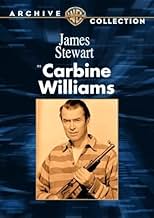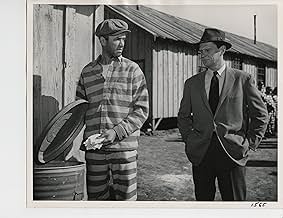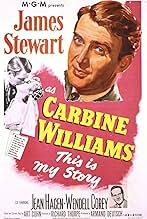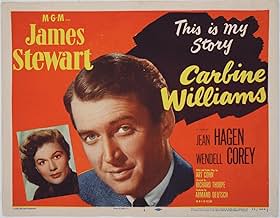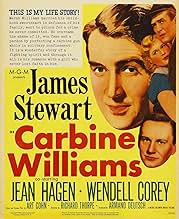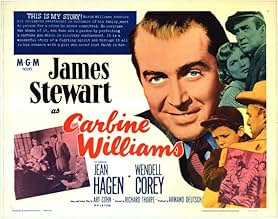Füge eine Handlung in deiner Sprache hinzuDavid Marshall Williams is sent to a prison farm where he works in the tool shop and eventually develops the precursor of the famous M-1 Carbine automatic rifle used in World War II.David Marshall Williams is sent to a prison farm where he works in the tool shop and eventually develops the precursor of the famous M-1 Carbine automatic rifle used in World War II.David Marshall Williams is sent to a prison farm where he works in the tool shop and eventually develops the precursor of the famous M-1 Carbine automatic rifle used in World War II.
- Auszeichnungen
- 1 wins total
Empfohlene Bewertungen
Before writing this review I took a look at the wikipedia article on Marsh Williams and found that MGM had stuck pretty close to telling the real story about Williams. For the farmer the Great Depression began after the Armistice was signed and the food they produced was no longer needed to feed troops. Many like Marsh Williams turned to making moonshine, not just as a way of distilling spirits for personal use, but for economic survival. That fact cannot be emphasized enough in telling the Carbine Williams story.
The federal men were seen as taking the bread out of the farmer's mouths in the North Carolina hills and other such places and the rural folk reacted accordingly. Williams was convicted of murdering a federal agent during a raid. He didn't get the death penalty because no one could tell who really fired the fatal shot, but as he was part of the group he shared responsibility. He got thirty years.
Williams was a skilled machinist and after he got over the bitterness of his incarceration with the help of a friendly warden he worked out the design of the weapon that later became the M-1 carbine rifle used by our armed forces in World War II.
James Stewart in developing his character as Marsh Williams borrowed a whole lot from some of the characters in his Anthony Mann westerns. This is not the 'aw shucks' Jimmy we all identify him with, but a very bitter man, as bitter even as George Bailey when he thinks the world's deserted him in It's A Wonderful Life.
Jean Hagen plays the Donna Reed like wife here who with a man incarcerated has a lot more troubles than Ms. Reed dealt with. The third major role is that of Wendell Corey's warden whose belief in Stewart is sustained.
Carbine Williams tread earlier along the same lines that Birdman of Alcatraz did. And in depicting the moonshining community, Carbine Williams shows folks that could have been the ancestors of the family Robert Mitchum was part of in Thunder Road. It's a good story about a man who found his soul and his work in the oddest of places.
In "Carbine Williams", Stewart plays the title role, a moonshiner who is convicted of murdering a Federal agent, and who then gets sent to a chain gang after being implicated in a prison murder. His rebellious nature brings him into conflict with the warden at the prison farm, Captain Peoples (Dracut MA's own Wendell Corey), until he discovers a means of channelling his anger and bitterness.
The real-life David Marshall Williams did indeed invent the improvements in firearms which led directly to the development to the M-1 carbine, the weapon which helped to win World War II. And he did it while serving a long prison sentence for murder. The story is interesting enough on its own, but Stewart brings an intensity and heart to the role which makes it even more fascinating than a mere telling of the facts would be.
One of many excellent films James Stewart made during the 1950's, this one is somewhat obscure, not particularly well-remembered today. But it deserves to be.
Marsh Willliams (James Stewart) is a guy with a chip on his shoulder, running a still during Prohibition. He is doing this for economic reasons, and also, like most people, thought that the 18th amendment was ridiculous. When his still is surrounded by federal agents. Marsh, along with the others working the still, run but first return fire with the agents, and one agent is killed. Convinced by his wife (Jean Hagen) to surrender, his murder trial ends in a mistrial - it could not be determined who fired the fatal shot - and Williams decides to plead guilty to second degree murder rather than have his father sell some of his land to pay for a second trial. He is sentenced to thirty years hard labor and unsuccessfully tries to convince his wife to divorce him so she can remarry somebody who can be with her.
On one level the film is a pseudo biography of Williams in prison and how he develops a semi-automatic rifle using just the tools he has in the prison blacksmith shop, and how focusing on that task literally changes his personality for the better. On another level it is a scathing indictment of the prison system and its brutality as it existed in the US until the middle of the twentieth century.
Jean Hagen plays Marsh's devoted and loyal wife, and Wendell Corey is good as H. T. Peoples, the warden of the prison farm Williams lands at after spending time in some horrendous places such as the chain gain and the rock pile. Peoples wants to know what makes Williams tick, but Williams keeps testing his authority in front of the other prisoners, creating a dangerous situation for himself should he just let these incidents go. When Williams ends up lasting 30 days in "the hole" when no other prisoner could endure a week he wants to know why, and the answer is intriguing.
At its core, Carbine Williams is a story of resilience, innovation, and redemption. Carbine's determination to develop a safer and more efficient firearm mechanism while serving time in prison is both inspirational and a testament to the human spirit's capacity for growth and change. The film does an excellent job of highlighting the importance of second chances and the potential for individuals to make positive contributions to society, even after making grave mistakes.
Williams' brilliant innovations in weapons design made a significant contribution to the Allied victory in WW2. I carried an M-1 carbine (essentially his design) in the Army and still own several of them -- perhaps the best all-purpose firearm in history.
This movie isn't shown often and most people are unaware of it, but it deserves a wider audience.
Wusstest du schon
- WissenswertesIn the film, all of the men working on the still with Williams were white. But in reality, it was five African-American men, all of whom testified against Williams at trial.
- Zitate
Marsh Williams: But there isn't enough time Maggie. You can have enough of everything else. You can enough food, you can enough land, you can even have enough money, but you never can have enough time, because it's the only thing you can't save.
- Crazy CreditsEPILOGUE: "The film concludes with the following written acknowledgment: 'Metro-Goldwyn-Mayer gratefully acknowledges the cooperation of the North Carolina prison authorities and wishes to state that the penal system existing in North Carolina today has been improved immeasurably over conditions depicted in the picture.'"
- Alternative VersionenOriginally filmed in black-and-white, it is also shown in a computer colorized version.
- VerbindungenReferenced in Sid & Judy (2019)
Top-Auswahl
- How long is Carbine Williams?Powered by Alexa
Details
- Erscheinungsdatum
- Herkunftsland
- Sprache
- Auch bekannt als
- Carbine Williams
- Drehorte
- 275 Winchester Avenue, New Haven, Connecticut, USA(opening establishing shot of the Winchester Repeating Arms Co. building - converted to apartments in 2014)
- Produktionsfirma
- Weitere beteiligte Unternehmen bei IMDbPro anzeigen
Box Office
- Budget
- 1.111.000 $ (geschätzt)
- Laufzeit1 Stunde 32 Minuten
- Farbe
- Seitenverhältnis
- 1.37 : 1
Zu dieser Seite beitragen


